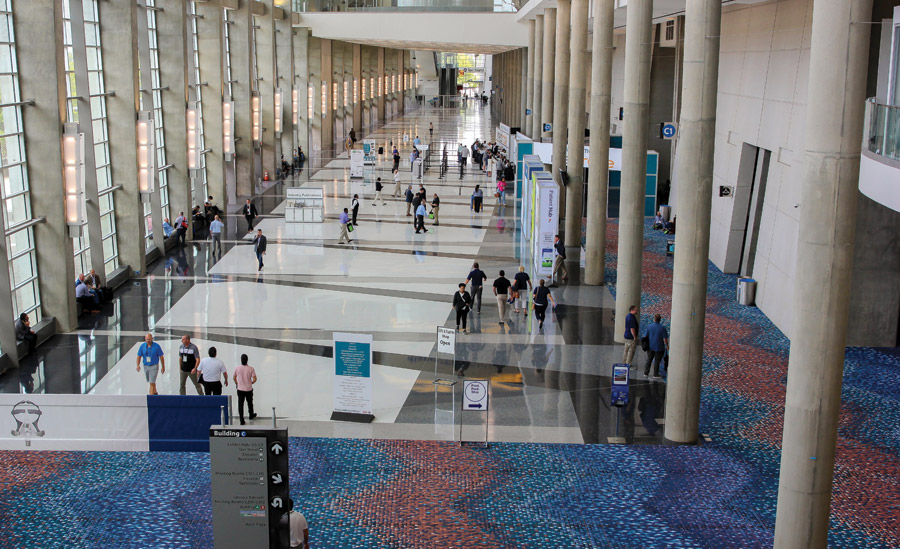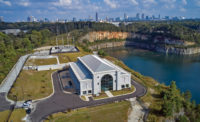March 2023 marked a high point for the Georgia World Congress Center Authority as it celebrated the topping out of the 453-ft-tall Signia by Hilton Atlanta hotel. The event marked more than reaching the physical peak for the tallest ground-up hotel project in the city in decades, it also marked the culmination of years of planning, patience and persistence by the GWCCA.
Throughout the remainder of 2023, the organization saw the project completed, and in January 2024, GWCCA unveiled the hotel as the latest jewel in its crown, joining the other world-class venues in the group’s portfolio, making it the largest combined convention, sports and entertainment campus in North America. The decade-long journey to construct the $326-million hotel provided plenty of twists and turns for the authority, says Kevin Duvall, chief operating officer at GWCCA.
“It’s a fabulous project,” Duvall says. “And we’re super proud of it, but I really think that you don’t typically see public entities, especially today … go all in on their future.”

The 976-room Signia by Hilton Hotel offers views of the Home Depot Backyard greenspace and Mercedes-Benz Stadium.
Photo courtesy Georgia World Congress Center
Success Story, Unfinished
Established by the state of Georgia in 1971 to oversee the development of an international trade and exhibition center in Atlanta, that goal was accomplished when the World Congress Center opened five years later. The authority oversees the operation of the campus as well as the Savannah Convention Center, which is undergoing a $276-million expansion to double its footprint and add a 900-space parking deck.
A 2022 analysis by researchers at Georgia State University set the center’s total economic impact at $1.37 billion in fiscal year 2021-2022, when the effects of the pandemic were still rippling across the travel and convention industry. According to its 2023 annual report, which reflects the preceding fiscal year, more than $4 million in campus development projects were completed and another $602 million were in the various stages of execution. And it’s not all about spending money either.
GWCCA’s 2023 annual report says the campus contributed $88 million in direct profit to the state in fiscal ’23, including a direct operating profit from the World Congress Center of nearly $6.7 million.
Numbers that highlight the center’s success during that year include 3.2 million visitors, equal to more than 8,800 every day, an 8% increase despite hosting about 30 fewer events than the previous year.
Atlanta’s Latest Landmark
The Signia by Hilton Atlanta hotel project took its first steps in 2013, setting its sights on redevelopment rights obtained through a deal with the Atlanta Falcons. Three firms were hired to provide a market study for a potential hotel on GWCCA’s campus. Two years later, the Drew Co. was brought on to lead the project.
The next leg of the journey led GWCCA leadership to Los Angeles, Houston, Chicago and New Orleans where the group studied various developments. In 2020, GWCCA tapped Hilton for the hotel operator and began preparing to start work. Then the COVID-19 pandemic hit ,forcing GWCCA to press pause on the project.
In the interim, the authority took time to refine drawings, pricing and other details. Discussions followed, Duvall says, on whether it should continue pursuing the hotel project at all. There was uncertainty about how long the pandemic might last and what impacts it would have on the event center and hospitality market.
“We're super proud of [the hotel], but I really think that you don't typically see public entities, especially today ... go all in on their future.”
—Kevin Duvall, COO, Georgia World Congress Center Authority
“Ultimately, we’re caretakers of facilities that have been started before us,” he says, adding that it’s a responsibility he takes seriously. “When I joined the organization over 20 years ago, I was stepping into an organization that was already fully developed. It had a great reputation and great facilities, and I know I had to be a steward of that, and a caretaker of that.”
Through the end of 2020, as the impacts of the pandemic became better understood, the bank called to tell GWCCA that an opportunity was coming up to go back to the market. The authority readied its position, selling bonds in March 2021 and embarking on the hotel project that would be a bellwether to see how the global market would react to a major project of that type.
The 976-room Signia by Hilton is Atlanta’s largest ground-up hotel development project in 40 years. It is connected to GWCCA’s Building C and overlooks the Home Depot Backyard, an 11-acre greenspace, and Mercedes-Benz Stadium.
Crews with Skanska, which served as general contractor for the hotel, found their own reasons to be patient and persistent because the new hotel would be partly constructed atop the remaining foundations from the Georgia Dome that was demolished in 2017. First, crews had to examine existing conditions. Then, columns and foundations for the new structure were reinforced with a combination of topping slabs and beams to spread out and accommodate the weight.
Ultimately, just under 300 auger-cast piles and 60 caissons between 54 in. and 86 in. in diameter were installed. That paved the way for the rest of the work to continue.
Now, with the project complete, Duvall says the board is looking ahead to the next update for its comprehensive plan, for which it has partnered with HKS.
“We’ve taken this big step of the hotel,” Duvall says. “Now, what’s next?

The Georgia World Congress Center hosted more than 3.2 million visitors in fiscal year 2022-23.
Photo courtesy Georgia World Congress Center
Keeping Ahead of the Curve
The authority didn’t neglect other initiatives amid the pandemic-era uncertainty, ultimately forging ahead with more than $615 million in planned capital projects. These included the hotel and a new pedestrian mall and transportation terminal project at the World Congress Center as well as a new parking deck, the addition of more than 500 parking spaces and a multiphase project to replace more than 2.2 million sq ft of roofing.
Ken Stockdell, director of project and program management, sits in a bit of a unique seat at the authority, he explains. With 35 years’ experience of convention center architecture under his belt, he now manages the center’s ever-evolving master plan.
“Now that we’ve wrapped the hotel up … what’s next? And what do we look like in 10, 20 years from now?” Stockdell asks.
Since 2010, the center has put more than $2 billion in public and private investment toward its 200-acre campus in the heart of downtown Atlanta, the largest in North America. The complex boasts more than 1 million sq ft of contiguous exhibit space. Alongside the new hotel, the Georgia World Congress Center also oversees Mercedes-Benz Stadium, home of the NFL’s Atlanta Falcons, and Centennial Olympic Park, commemorating Atlanta’s 1996 Olympic Games that brought the attention of the world to the city.
Thirty years later, the center is preparing to be the focus of the globe’s attention once again. The site will host eight games of the 2026 FIFA World Cup. That follows its turn hosting the NCAA College Football Championship in 2025. All of which have Stockdell lining up work on the facility roof and taking stock on what yet-to-be-determined projects will be necessitated by the World Cup.
“They're collaborative, they're innovative .... They're willing to jump in and help however they can, and that really boils down to the people.”
—Brad Hutto, Vice President, Holder Construction
“I’ve kind of preached the mantra since I’ve been here that there’s nothing that we work on in this building that’s not customer facing,” he says. “Whether it’s a roof or an air handling unit or the pedestrian mall.”
The best outcome for Stockdell is a facility operations team that’s invisible to the throngs of soccer or football fans, convention attendees or hotel visitors.
Success also means hitting the occasional curveball, like during Christmas 2022, when abnormally low temperatures led three air handlers to freeze up. Crews returned from the holiday break to find 3 ft of water in the air-handling room.
Brad Hutto, vice president with Holder Construction, can testify to the authority’s ability to adapt and keep working while the center stays open.
Hutto worked consistently with GWCCA between 2014-2022 on a variety of projects, including work at Mercedes-Benz Stadium, the Home Depot Backyard area, parking decks and more, including the B+C Connector project, which added 110,000 sq ft between two of the center’s exhibit halls.
Flexible and Focused
In 19 years at Holder, Hutto has worked on multiple convention centers across the country, and he says
GWCCA ranks among the top of those he’s worked with.
“They’re collaborative, they’re innovative,” says Hutto, who also served as project manager for
GWCCA’s demolition of the Georgia Dome. “They’re willing to jump in and help however they can, and that really boils down to the people.”
Naming Stockdell and Duvall, Hutto also noted Jeff Oden, senior director of campus operations, and Frank Poe, executive director, as people at the top who set the tone for the organization’s culture and success.
A project that stands out is the B+C Connector, a $55-million project that won First Place for Construction Excellence in the 2020 AGC Build Georgia Awards. The project had to confront the challenges of working at a busy site and required GWCCA to successfully navigate those hurdles for both its customers and its contractors.
The center’s scale gives it a hand up when projects go to bid, bringing in plenty of competition for high-profile jobs like the Signia.
“They’re very professional and calm under pressure,” Hutto says. “There’s going to be bumps in the road along the way, but it’s how people react in those times in the heat of the moment.”
But the center’s operational success can threaten to hamper its capital projects once construction is underway because the campus is still open to thousands of visitors for an array of events.
“Everyone wants the project done, they just don’t want it done during their event,” says Duvall.
One ongoing project, a three-year effort that started in February to replace 35 escalators, is a timely example, Stockdell says, with various teams across the organization now coordinating to minimize impacts on customers.
“Construction can be noisy, vibrating, impactful,” says Hutto, of the B+C Connector. “They were more collaborative with how we operate and how we work and trying to help us adapt.”
Work was scheduled to accommodate events and shifted further if the need arose to the afternoon, morning or weekend to minimize impacts on guests. And it’s the organization’s exceptional communication, he says, that keeps things running smoothly amid those changes.






Post a comment to this article
Report Abusive Comment